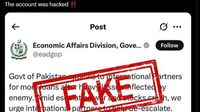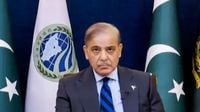On May 9, 2025, Pakistan found itself in a precarious situation following a controversial social media post that appeared to solicit urgent financial assistance from international lenders. The message, which cited severe economic losses amid escalating tensions with India, quickly garnered widespread attention before the government claimed that their official account had been hacked.
The post from Pakistan's Economic Affairs Division read: "Govt of Pakistan appeals to International Partners for more loans after heavy losses inflicted by enemy. Amid escalating war and stocks crash, we urge international partners to help de-escalate. Nation urged to remain steadfast." This unexpected appeal raised eyebrows, particularly as Pakistan is one of the largest debtors to the International Monetary Fund (IMF), with approximately USD 8.8 billion outstanding.
In a swift response to the growing media frenzy, the ministry of economic affairs issued a denial, asserting that their social media account had been compromised. A spokesperson for the ministry told Reuters, "We are working to have the Twitter (X) switched off," insisting they "did not tweet" the appeal. However, the post remained visible even after the clarification, leading to confusion and skepticism among observers.
The timing of the alleged hacking coincided with heightened military tensions between India and Pakistan. On May 7, India launched "Operation Sindoor" in retaliation for a terrorist attack in Pahalgam that left 26 civilians dead. This operation targeted nine terror-linked sites in Pakistan and Pakistan-occupied Jammu and Kashmir, including facilities associated with militant groups such as Lashkar-e-Taiba and Jaish-e-Mohammed.
In response to India's military campaign, Pakistan attempted to strike back with drone and missile attacks on Indian military facilities across Northern and Western India. However, these attempts were reportedly thwarted by India's integrated air defense systems. Following these exchanges, Indian forces retaliated by destroying several Pakistani air defense systems, including one located in Lahore.
As the conflict escalated, the Karachi Stock Exchange's KSE-100 index saw a significant decline, dropping over 7,500 points—approximately 6%—since late April. Moody's, a prominent ratings agency, warned that any sustained military escalation with India could severely impact Pakistan's economic stability and undermine growth prospects.
Amid this turmoil, the initial post from Pakistan's Economic Affairs Division raised questions about the country's financial stability and reliance on foreign aid. Critics pointed out that Pakistan has a long history of seeking financial support from international lenders during economic hardships. The fact-checking arm of the Ministry of Information and Broadcasting later labeled the original tweet as a "FAKE TWEET," further complicating the narrative surrounding the event.
Indian Foreign Secretary Vikram Misri commented on the situation, stating that India's executive director at the IMF would present India's stance on any potential financial rescue for Pakistan during an upcoming board meeting in Washington. Misri emphasized that many of the 24 IMF packages previously granted to Pakistan had not ended successfully, raising doubts about the viability of providing additional funding.
As tensions between the two nations continue to escalate, the economic implications for Pakistan are becoming increasingly dire. The stock market's downturn and the potential for further military conflict could exacerbate the country's existing financial woes. Investors are understandably shaken, leading to capital flight and further instability in the financial markets.
While the Pakistani government insists that the appeal for loans was a result of a hacking incident, observers remain skeptical. The possibility that the post was a poorly crafted internal message, later attributed to a cyberattack, raises questions about the government's transparency and the authenticity of its communications.
In the backdrop of this unfolding crisis, the international community watches closely. The interplay of military actions and economic conditions presents a complex challenge for both India and Pakistan. As Pakistan navigates its financial obligations and diplomatic relations, the effects of the ongoing conflict will likely reverberate throughout the region.
With the potential for further military engagements and economic instability, the situation remains fluid. Pakistan's request for international aid, whether genuine or not, underscores the precarious nature of its current circumstances. As the government works to regain control over its messaging and address the economic fallout, the future remains uncertain.
In summary, the incident involving Pakistan's Economic Affairs Division serves as a stark reminder of the interconnectedness of military conflict and economic stability. As both nations grapple with their respective challenges, the international community's response will play a crucial role in shaping the future of the region.



